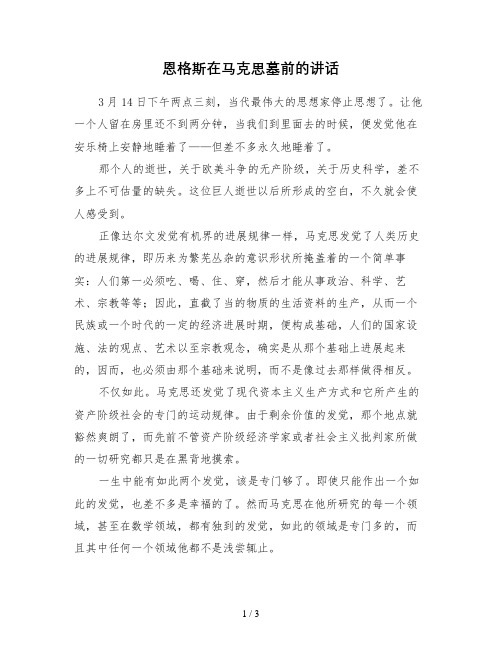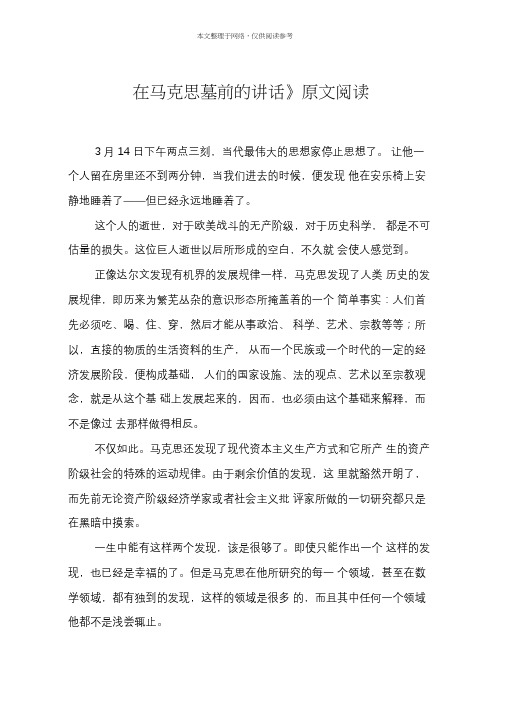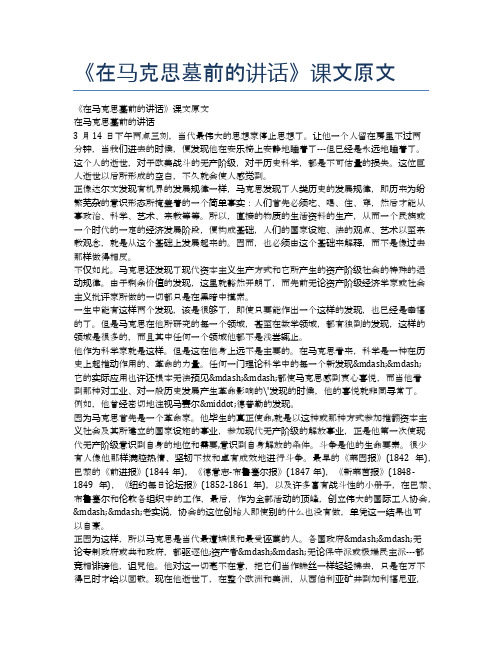在马克思墓前的讲话(中英)
《在马克思墓前的讲话》原文阅读

《在马克思墓前的讲话》原文阅读3月14日下午两点三刻,当代最伟大的思想家停止思想了。
让他一个人留在房里还不到两分钟,当我们进去的时候,便发现他在安乐椅上安静地睡着了一一但已经永远地睡着了。
这个人的逝世,对于欧美战斗的无产阶级,对于历史科学,都是不可估量的损失。
这位巨人逝世以后所形成的空白,不久就会使人感觉到。
正像达尔文发现有机界的发展规律一样,马克思发现了人类历史的发展规律,即历来为繁芜丛杂的意识形态所掩盖着的一个简单事实:人们首先必须吃、喝、住、穿,然后才能从事政治、科学、艺术、宗教等等;所以,直接的物质的生活资料的生产,从而一个民族或一个时代的一定的经济发展阶段,便构成基础,人们的国家设施、法的观点、艺术以至宗教观念,就是从这个基础上发展起来的,因而,也必须由这个基础来解释,而不是像过去那样做得相反。
不仅如此。
马克思还发现了现代资本主义生产方式和它所产生的资产阶级社会的特殊的运动规律。
由于剩余价值的发现,这里就豁然开朗了,而先前无论资产阶级经济学家或者社会主义批评家所做的一切研究都只是在黑暗中摸索。
一生中能有这样两个发现,该是很够了。
即使只能作出一个这样的发现,也已经是幸福的了。
但是马克思在他所研究的每一个领域,甚至在数学领域,都有独到的发现,这样的领域是很多的,而且其中任何一个领域他都不是浅尝辄止。
他作为科学家就是这样。
但是这在他身上远不是主要的。
在马克思看来,科学是一种在历史上起推动作用的、革命的力量。
任何一门理论科学中的每一个新发现一一它的实际应用也许还根本无法预见一一都使马克思感到衷心喜悦,而当他看到那种对工业、对一般历史发展立即产生革命性影响的发现的时候,他的喜悦就非同寻常了。
例如,他曾经密切注视电学方面各种发现的进展情况,不久以前,他还密切注视马赛尔•德普勒的发现396。
因为马克思首先是一个革命家。
他毕生的真正使命,就是以这种或那种方式参加推翻资本主义社会及其所建立的国家设施的事业,参加现代无产阶级的解放事业,正是他第一次使现代无产阶级意识到自身的地位和需要,意识到自身解放的条件。
在马克思墓前的讲话全文 恩格斯在马克思墓前的讲话

在马克思墓前的讲话全文恩格斯在马克思墓前的讲话各位读友大家好,此文档由网络收集而来,欢迎您下载,谢谢《在马克思墓前的讲话》是恩格斯作为马克思的亲密战友在马克思墓仪上发表的讲话。
恩格斯用英语发表的这篇讲话,代表全世界无产阶级对于马克思的逝世表示了深切的哀悼,以下是学习啦XX为你整理的在马克思墓前的讲话,希望能帮到你。
3月14日下午两点三刻,当代最伟大的思想家停止思想了。
让他一个人留在房里不过两分钟,当我们进去的时候,便发现他在安乐椅上安静地睡着了---但已经是永远地睡着了。
这个人的逝世,对于欧美战斗的无产阶级,对于历史科学,都是不可估量的损失。
这位巨人逝世以后所形成的空白,不久就会使人感觉到。
正像达尔文发现有机界的发展规律一样,马克思发现了人类历史的发展规律,即历来为纷繁芜杂的意识形态所掩盖着的一个简单事实:人们首先必须吃、喝、住、穿,然后才能从事政治、科学、艺术、宗教等等。
所以,直接的物质的生活资料的生产,从而一个民族或一个时代的一定的经济发展阶段,便构成基础,人们的国家设施、法的观点、艺术以至宗教观念,就是从这个基础上发展起来的。
因而,也必须由这个基础来解释,而不是像过去那样做得相反。
不仅如此。
马克思还发现了现代资本主义生产方式和它所产生的资产阶级社会的特殊的运动规律。
由于剩余价值的发现,这里就豁然开朗了,而先前无论资产阶级经济学家或社会主义批评家所做的一切都只是在黑暗中摸索。
一生中能有这样两个发现,该是很够了,即使只要能作出一个这样的发现,也已经是幸福的了。
但是马克思在他所研究的每一个领域,甚至在数学领域,都有独到的发现,这样的领域是很多的,而且其中任何一个领域他都不是浅尝辄止。
他作为科学家就是这样。
但是这在他身上远不是主要的。
在马克思看来,科学是一种在历史上起推动作用的、革命的力量。
任何一门理论科学中的每一个新发现——它的实际应用也许还根本无法预见——都使马克思感到衷心喜悦,而当他看到那种对工业、对一般历史发展产生革命影响的发现的时候,他的喜悦就非同寻常了。
在马克思墓前的讲话(正稿)

湖南信息学院
自强不息 敢为人先 1844年8月,恩格斯从英 国返回德国,途中来到巴黎, 拜访了马克思。这次会晤为 两人今后的合作奠定了基础。 之后的四十年时间里,他们 共同战斗,共同创造革命理 论,共拟《共产党宣言》, 合作《资本论》。
湖南信息学院
自强不息 敢为人先
作为马克思伟大事业的终身战友的恩格斯, 在马克思逝世以后,出色地完成了《资本论》 第二、第三卷的整理出版工作,卓越地领导了 国际工人运动,直至1895年8月5日因病逝世。 正如列宁所说,在马克思之后,“恩格斯是整 个文明世界中最卓越的学者和现代无产阶级的 导师”。
湖南信息学院
自强不息 敢为人先
思想内容分析;
恩格斯的悼词简短、诚恳而又真实地阐 述了马克思一生为无产阶级和全人类的 解放事业所做的伟大贡献,表达了全世 界无产阶级和劳动人民对伟大导师马克 思无限崇敬、爱戴和深切悼念的心情。
湖南信息学院
自强不息 敢为人先
三、内容结构:
整体感知:分三个部分
第一部分(1—2 自然段):悼念 (记叙) 介绍马克思逝世的时间、地点以及情景。
湖南信息学院
一、作者介绍
自强不息 敢为人先 弗· 恩格斯(1820—1895) 德国人。科学共产主义的创始 人,全世界无产阶级的导师和 领袖,马克思的亲密战友。在 革命斗争中,他和马克思一起 创立了无产阶级革命理论── 马克思主义,一起领导了共产 主义者同盟、第一国际和德国 社会民主工党。马克思逝世后, 恩格斯继续担任欧洲社会主义 者的领导和顾问。他一生同形 形色色的机会主义进行了坚决 斗争,给无产阶级留下了极为 宝贵的精神财富。
演讲词
从这个标题中的“墓前”和“讲话”, 我们看出这是一篇以议论为主,悼词性 质的演说辞。
《在马克思墓前的讲话》课文原文

《在马克思墓前的讲话》课文原文在马克思墓前的讲话3月14日下午两点三刻,当代最伟大的思想家停止思想了。
让他一个人留在房里不过两分钟,当我们进去的时候,便发现他在安乐椅上安静地睡着了---但已经是永远地睡着了。
这个人的逝世,对于欧美战斗的无产阶级,对于历史科学,都是不可估量的损失。
这位巨人逝世以后所形成的空白,不久就会使人感觉到。
正像达尔文发现有机界的发展规律一样,马克思发现了人类历史的发展规律,即历来为纷繁芜杂的意识形态所掩盖着的一个简单事实:人们首先必须吃、喝、住、穿,然后才能从事政治、科学、艺术、宗教等等。
所以,直接的物质的生活资料的生产,从而一个民族或一个时代的一定的经济发展阶段,便构成基础,人们的国家设施、法的观点、艺术以至宗教观念,就是从这个基础上发展起来的。
因而,也必须由这个基础来解释,而不是像过去那样做得相反。
不仅如此。
马克思还发现了现代资本主义生产方式和它所产生的资产阶级社会的特殊的运动规律。
由于剩余价值的发现,这里就豁然开朗了,而先前无论资产阶级经济学家或社会主义批评家所做的一切都只是在黑暗中摸索。
一生中能有这样两个发现,该是很够了,即使只要能作出一个这样的发现,也已经是幸福的了。
但是马克思在他所研究的每一个领域,甚至在数学领域,都有独到的发现,这样的领域是很多的,而且其中任何一个领域他都不是浅尝辄止。
他作为科学家就是这样。
但是这在他身上远不是主要的。
在马克思看来,科学是一种在历史上起推动作用的、革命的力量。
任何一门理论科学中的每一个新发现——它的实际应用也许还根本无法预见——都使马克思感到衷心喜悦,而当他看到那种对工业、对一般历史发展产生革命影响的发现的时候,他的喜悦就非同寻常了。
例如,他曾经密切地注视马赛尔·德普勒的发现。
因为马克思首先是一个革命家。
他毕生的真正使命,就是以这种或那种方式参加推翻资本主义社会及其所建立的国家设施的事业,参加现代无产阶级的解放事业,正是他第一次使现代无产阶级意识到自身的地位和需要,意识到自身解放的条件。
恩格斯在马克思墓前的讲话

恩格斯在马克思墓前的讲话3月14日下午两点三刻,当代最伟大的思想家停止思想了。
让他一个人留在房里还不到两分钟,当我们到里面去的时候,便发觉他在安乐椅上安静地睡着了——但差不多永久地睡着了。
那个人的逝世,关于欧美斗争的无产阶级,关于历史科学,差不多上不可估量的缺失。
这位巨人逝世以后所形成的空白,不久就会使人感受到。
正像达尔文发觉有机界的进展规律一样,马克思发觉了人类历史的进展规律,即历来为繁芜丛杂的意识形状所掩盖着的一个简单事实:人们第一必须吃、喝、住、穿,然后才能从事政治、科学、艺术、宗教等等;因此,直截了当的物质的生活资料的生产,从而一个民族或一个时代的一定的经济进展时期,便构成基础,人们的国家设施、法的观点、艺术以至宗教观念,确实是从那个基础上进展起来的,因而,也必须由那个基础来说明,而不是像过去那样做得相反。
不仅如此。
马克思还发觉了现代资本主义生产方式和它所产生的资产阶级社会的专门的运动规律。
由于剩余价值的发觉,那个地点就豁然爽朗了,而先前不管资产阶级经济学家或者社会主义批判家所做的一切研究都只是在黑背地摸索。
一生中能有如此两个发觉,该是专门够了。
即使只能作出一个如此的发觉,也差不多是幸福的了。
然而马克思在他所研究的每一个领域,甚至在数学领域,都有独到的发觉,如此的领域是专门多的,而且其中任何一个领域他都不是浅尝辄止。
他作为科学家确实是如此。
然而这在他身上远不是要紧的。
在马克思看来,科学是一种在历史上起推动作用的、革命的力量。
任何一门理论科学中的每一个新发觉——它的实际应用也许还全然无法预见——都使马克思感到衷心欢乐,而当他看到那种对工业、对一样历史进展赶忙产生革命性阻碍的发觉的时候,他的欢乐就非同平常了。
例如,他曾经紧密凝视电学方面各种发觉的进展情形,不久往常,他还紧密凝视马赛尔·德普勒的发觉396。
因为马克思第一是一个革命家。
他毕生的真正使命,确实是以这种或那种方式参加推翻资本主义社会及其所建立的国家设施的事业,参加现代无产阶级的解放事业,正是他第一次使现代无产阶级意识到自身的地位和需要,意识到自身解放的条件。
在马克思墓前的讲话【汉译版】

在马克思墓前的讲话——弗里德里希 恩格斯3月14日下午两点三刻,当代最伟大的思想家停止思想了。
让他一个人留在房里还不到两分钟,当我们进去的时候,便发现他在安乐椅上安静地睡着了——但已经永远睡着了。
这个人的逝世,对于欧美战斗的无产阶级,对于历史科学,都是不可估量的损失。
这位巨人逝世以后所形成的空白,不久之后就会使人感觉到。
正像达尔文发现了有机界的发展规律一样,马克思发现了人类社会的发展规律,即历来为繁芜丛杂的意识形态所掩盖的一个简单事实:人们必须吃、喝、住、穿,然后才能从事政治、科学、艺术、宗教等等。
所以直接的物质的生活资料的生产,一个民族或一个时代的一定的经济发展阶段,便构成了基础,人们的国家设施、法的观点、艺术以致宗教观念,就是从这个基础上发展起来的,因而也必须由这个基础来解释,而不是像过去那样做得相反。
不仅如此,马克思还发现了现代资本主义生产方式和它所产生的资产阶级社会的特殊的运动规律。
由于剩余价值的发现,这里豁然开朗,而先前资产阶级经济学家或社会主义批判家所做的一切研究都只是在黑暗中摸索。
一生中能有这两个发现,该是很够了。
即使只能做出一个这样的发现也已经是幸福的了。
但是马克思在他所研究的每一个领域,甚至在数学领域,都有独到的发现。
这样的领域是很多的,而且其中任何一个领域他都不是浅尝辄止。
他作为科学家就是这样。
但这在他身上远不是主要的。
在马克思看来,科学是一种在历史上起推动作用的、革命的力量。
任何一门理论科学的每一个新发现——它的实际应用也许还根本无法预见——都使马克思感到衷心喜悦,而当他看到那种对工业、对一般历史发展立即产生革命性影响发现的时候,他的喜悦就非同寻常了。
例如,他曾密切注视电学方面各种方面的进展情况。
不久以前,他还密切注视马塞尔 德普勒的发现。
因为马克思首先是一个革命家。
他毕生的真正使命,就是以这种或那种方式参加推翻资本主义社会及其建立的国家设施的事业,参加现代无产阶级的解放事业,正是他第一次使现代无产阶级意识到了自身的地位和需要,意识到自身解放的条件。
《在马克思墓前的讲话》教案

《在马克思墓前的讲话》教案一、教学目标1.了解马克思的思想、生平事迹以及其在中国的影响;2.学习使用英文口头表达方式;3.提高学生的语言表达能力和文字阅读能力。
二、教学重点1.学习马克思的思想和生平事迹;2.学习使用英文口头表达方式。
三、教学难点1.学习如何在英文下进行思维;2.学习如何表达并结合马克思的思想。
四、教学内容1.在马克思墓前的讲话(附中英文对照版):Dear Marx,I stand before you as a humble representative of an evolving world, representing its people and their needs, wants and aspirations. Your ideas and theories have influenced the interactions and the lives of millions of people across the world. For this reason, I standwith great admiration and respect at your monument.Your pen has proved to be mightier than any weapon, and your ideas have been the impetus of change, inspiring many people to fight for what is just, and true.You have given birth to a deeply rooted sense of equality, social justice and fair governance, that have resonated with the masses even after a century of your death.We are living in turbulent times, with many people suffering from inequality and poverty, while a few are enjoying unparallel riches, and opportunities.Your thoughts and ideologies have given the strength and the conviction to the masses. To stand up, and fight for their rights, and demand fair and equal treatment from those in positions of authority.Your message was clear and peaceful, the aim was equality, and the benefits far-reaching.As I stand before you, dear Marx, I can only offer you my full respect and admiration, for your sacrifices and musings have greatly influenced the world, and have given birth to ideologies that still remain relevant today.To this end, I promise to continue to fight, and advocate for those whose voice cannot be heard and to champion the cause of equality, equity and fairness.Thank you for the inspiration, and may your ideas continue toignite our hearts and minds.Signed:A grateful follower of your work.亲爱的马克思:我作为世界发展的代表,代表着人们的需求、愿望和追求,站在你的纪念碑前,非常敬重和钦佩你的思想和理论。
《在马克思墓前的讲话》课文原文

《在马克思墓前的讲话》课文原文在马克思墓前的讲话3月14日下午两点三刻,当代最伟大的思想家停止思想了。
让他一个人留在房里不过两分钟,当我们进去的时候,便发现他在安乐椅上安静地睡着了---但已经是永远地睡着了。
这个人的逝世,对于欧美战斗的无产阶级,对于历史科学,都是不可估量的损失。
这位巨人逝世以后所形成的空白,不久就会使人感觉到。
正像达尔文发现有机界的发展规律一样,马克思发现了人类历史的发展规律,即历来为纷繁芜杂的意识形态所掩盖着的一个简单事实:人们首先必须吃、喝、住、穿,然后才能从事政治、科学、艺术、宗教等等。
所以,直接的物质的生活资料的生产,从而一个民族或一个时代的一定的经济发展阶段,便构成基础,人们的国家设施、法的观点、艺术以至宗教观念,就是从这个基础上发展起来的。
因而,也必须由这个基础来解释,而不是像过去那样做得相反。
不仅如此。
马克思还发现了现代资本主义生产方式和它所产生的资产阶级社会的特殊的运动规律。
由于剩余价值的发现,这里就豁然开朗了,而先前无论资产阶级经济学家或社会主义批评家所做的一切都只是在黑暗中摸索。
一生中能有这样两个发现,该是很够了,即使只要能作出一个这样的发现,也已经是幸福的了。
但是马克思在他所研究的每一个领域,甚至在数学领域,都有独到的发现,这样的领域是很多的,而且其中任何一个领域他都不是浅尝辄止。
他作为科学家就是这样。
但是这在他身上远不是主要的。
在马克思看来,科学是一种在历史上起推动作用的、革命的力量。
任何一门理论科学中的每一个新发现——它的实际应用也许还根本无法预见——都使马克思感到衷心喜悦,而当他看到那种对工业、对一般历史发展产生革命影响的发现的时候,他的喜悦就非同寻常了。
例如,他曾经密切地注视马赛尔·德普勒的发现。
因为马克思首先是一个革命家。
他毕生的真正使命,就是以这种或那种方式参加推翻资本主义社会及其所建立的国家设施的事业,参加现代无产阶级的解放事业,正是他第一次使现代无产阶级意识到自身的地位和需要,意识到自身解放的条件。
《在马克思墓前的讲话》原文阅读

在马克思墓前的讲话》原文阅读3月14 日下午两点三刻,当代最伟大的思想家停止思想了。
让他一个人留在房里还不到两分钟,当我们进去的时候,便发现他在安乐椅上安静地睡着了——但已经永远地睡着了。
这个人的逝世,对于欧美战斗的无产阶级,对于历史科学,都是不可估量的损失。
这位巨人逝世以后所形成的空白,不久就会使人感觉到。
正像达尔文发现有机界的发展规律一样,马克思发现了人类历史的发展规律,即历来为繁芜丛杂的意识形态所掩盖着的一个简单事实:人们首先必须吃、喝、住、穿,然后才能从事政治、科学、艺术、宗教等等;所以,直接的物质的生活资料的生产,从而一个民族或一个时代的一定的经济发展阶段,便构成基础,人们的国家设施、法的观点、艺术以至宗教观念,就是从这个基础上发展起来的,因而,也必须由这个基础来解释,而不是像过去那样做得相反。
不仅如此。
马克思还发现了现代资本主义生产方式和它所产生的资产阶级社会的特殊的运动规律。
由于剩余价值的发现,这里就豁然开朗了,而先前无论资产阶级经济学家或者社会主义批评家所做的一切研究都只是在黑暗中摸索。
一生中能有这样两个发现,该是很够了。
即使只能作出一个这样的发现,也已经是幸福的了。
但是马克思在他所研究的每一个领域,甚至在数学领域,都有独到的发现,这样的领域是很多的,而且其中任何一个领域他都不是浅尝辄止。
他作为科学家就是这样。
但是这在他身上远不是主要的。
在马克思看来,科学是一种在历史上起推动作用的、革命的力量。
任何一门理论科学中的每一个新发现——它的实际应用也许还根本无法预见——都使马克思感到衷心喜悦,而当他看到那种对工业、对一般历史发展立即产生革命性影响的发现的时候,他的喜悦就非同寻常了。
例如,他曾经密切注视电学方面各种发现的进展情况,不久以前,他还密切注视马赛尔·德普勒的发现396。
因为马克思首先是一个革命家。
他毕生的真正使命,就是以这种或那种方式参加推翻资本主义社会及其所建立的国家设施的事业,参加现代无产阶级的解放事业,正是他第一次使现代无产阶级意识到自身的地位和需要,意识到自身解放的条件。
在马克思墓前的讲话

悼词的结构
开头——述其哀——悼念:一般介绍死者 姓名,身份,职务,逝世的时间,地点,原因 及其享年等等。
主体——赞其功——评价:追述死者的经 历及一生中主要成就和贡献。(重点) 结尾——颂其德——悼念:对死者的悼念 以及对参加悼念仪式的人提出希望和要求。
1、 3月14日下午两点三刻,当代最伟大
的思想家停止思想了。让他一个人留在房里 还不到两分钟,等我们再进去的时候,便发 现他在安乐椅上安静地睡着了——但已经是 永远地睡着了。
赏析:“豁然开朗”和“在黑暗中摸索”构成了强 烈鲜明的对比,从而热烈地赞颂了马克思发现剩余 价值规律的伟大意义,这两个形象可感的词语,把 抽象的事理表现得可感可见。
5、如何理解下面的句子。
他对这一切毫不在意,把它们当做蛛丝一样轻轻拂去,只是在万 不得已时才给以回敬。 运用比喻的修辞,把敌人的攻击当作蛛丝,含蓄发人深思。 它具有两方面的含义:一是说明敌人对马克思的攻击很多, 但十分无力;二是表明马克思对敌人的嫉恨和诬蔑的极度蔑 视,这些丝毫不会令他挂怀,表现了马克思崇高的思想境界。 而我可以大胆地说:他可能有过许多敌人,但未必有一个私敌。 “私敌”是指有个人恩怨的敌人。 “许多敌人”都是因阶级 利益冲突而结下的,都是团结在他周围的千百万革命战友共 同的敌人,说明马克思不存私念,为人无懈可击。这种含蓄 的评价高度赞扬了马克思的光明磊落、大公无私的高尚革命 精神。
经济基础决定上层建筑
因而 因而,也必须由这个基础来解释,而不是像过去 那样做得相反。 上层建筑由经济基础来解释
人 类 历 史 的 发 展 规 律
正像达尔文发现有机界的发展规律一样, 马克思 繁芜丛杂 发现 了人类历史的发展规律, 即历来为繁芜丛杂的 意识形态所掩盖着的一个简单事实: 简单事实 人们首先必须吃、 喝、住、穿,然后才能从事政治、科学、艺术、宗教 这一比较是修饰主干中“发 这句是对上面一句话的补 等等。所以,直接的物质的生活资料的生产,从而一 现”的状语,突出了马克思这 充说明。这里用反动意识 一发现的伟大历史意义。状 个民族或一个时代的一定的经济发展阶段,便构成为 形态为剥削散布重重迷雾 语的提前,则对意义的伟大 基础,人们的国家制度,法的观点,艺术以至宗教观 更进一步起了强调的作用。 来反衬马克思从简单事实 念,就是从这个基础上发展起来的。因而,也必须由 充分说明,这一发现在人类 中揭示真理所经历的复杂 这个基础来解释,而不是像过去那样做得相反。 认识史上是一次划时代的飞
《在马克思墓前的讲话》课文原文

《在马克思墓前的讲话》课文原文《在马克思墓前的讲话》课文原文在马克思墓前的讲话3月14日下午两点三刻,当代最伟大的思想家停止思想了。
让他一个人留在房里不过两分钟,当我们进去的时候,便发现他在安乐椅上安静地睡着了---但已经是永远地睡着了。
这个人的逝世,对于欧美战斗的无产阶级,对于历史科学,都是不可估量的损失。
这位巨人逝世以后所形成的空白,不久就会使人感觉到。
正像达尔文发现有机界的发展规律一样,马克思发现了人类历史的发展规律,即历来为纷繁芜杂的意识形态所掩盖着的一个简单事实:人们首先必须吃、喝、住、穿,然后才能从事政治、科学、艺术、宗教等等。
所以,直接的物质的生活资料的生产,从而一个民族或一个时代的一定的经济发展阶段,便构成基础,人们的国家设施、法的观点、艺术以至宗教观念,就是从这个基础上发展起来的。
因而,也必须由这个基础来解释,而不是像过去那样做得相反。
不仅如此。
马克思还发现了现代资本主义生产方式和它所产生的资产阶级社会的特殊的运动规律。
由于剩余价值的发现,这里就豁然开朗了,而先前无论资产阶级经济学家或社会主义批评家所做的一切都只是在黑暗中摸索。
一生中能有这样两个发现,该是很够了,即使只要能作出一个这样的发现,也已经是幸福的了。
但是马克思在他所研究的每一个领域,甚至在数学领域,都有独到的发现,这样的领域是很多的,而且其中任何一个领域他都不是浅尝辄止。
他作为科学家就是这样。
但是这在他身上远不是主要的。
在马克思看来,科学是一种在历史上起推动作用的、革命的力量。
任何一门理论科学中的每一个新发现——它的实际应用也许还根本无法预见——都使马克思感到衷心喜悦,而当他看到那种对工业、对一般历史发展产生革命影响的\'发现的时候,他的喜悦就非同寻常了。
例如,他曾经密切地注视马赛尔·德普勒的发现。
因为马克思首先是一个革命家。
在马克思墓前的讲话

介绍死者的生前身份、逝 世时间、地点、原因及其 享年等。 追述死者的经历及一生中 主要成就和贡献。(重点) 对死者表示哀悼之情, 对悼念人提出希望和要 求等。
永他 垂们 不的 朽英 !名 和 文 章
ห้องสมุดไป่ตู้
作者介绍
弗· 恩格斯(1820— 1895),科学共产主义的创 始人,全世界无产阶级的导师 和领袖,马克思的亲密战友。 德国人。在革命斗争中,他和 马克思一起创立了无产阶级革 命理论──马克思主义。他和 马克思一起领导了共产主义者 同盟、第一国际和德国社会民 主工党。马克思逝世后,恩格 斯一个人继续担任欧洲社会主 义者的领导和顾问。
伦敦海格特公墓 卡尔· 马克思墓
历史上的哲学家总是千方百计 以各种各样的方式解释世界,然而 更重要的在于改造世界。
马克思介绍
马克思于1818年5月5日生于德国底特律市一个 法律顾问的家庭,家境富裕、文明. 1841年柏林大学毕业23岁 1843年6月与出身名门、美丽的燕妮结婚 1843年10月赴巴黎定居 1845年1月被逐出法国 1848年3月被逐出比利时 1849年5月被逐出德国 1849年8月被逐出法国——已一贫如洗
“还不到两分钟……永远地睡着了”有何含义作用? 有交代作用,还突出强调了马克思为事业奋斗 一生,临终还在辛勤工作的伟大形象 “还不到两分钟”写出了恩格斯未能在马克思 生前与他见最后一面的极大遗憾; “在安乐椅上睡着了”用讳饰的手法委婉到写 马克思从容安详的逝世,语气平静含蓄,却蕴含着巨 大的情感力量;
存在决定意识
对于欧美战斗 着的无产阶级 对于历史科学 经济基础决定上层 建筑 剩余价值规律
以报刊册子等 宣传革命
创立国际工 人协会
在马克思墓前的讲话原文及翻译

Frederick EngelsKarl Marx's FuneralDer Sozialdemokrat, March 22, 1883On Saturday, March 17, Marx was laid to rest in Highgate Cemetery, in the same grave in which his wife had been buried fifteen months earlier.At the graveside Gottlieb Lemke laid two wreaths with red ribbons on the coffin in the name of the editorial board and dispatching service of the Sozialdemokrat and in the name of the London Communist Workers' Educational Society.Frederick Engels then made the following speech in English:"On the 14th of March, at a quarter to three in the afternoon, the greatest living thinker ceased to think. He had been left alone for scarcely two minutes, and when we came back we found him in his armchair, peacefully gone to sleep-but forever."An immeasurable loss has been sustained both by the militant proletariat of Europe and America, and by historical science, in the death of this man. The gap that has been left by the departure of this mighty spirit will soon enough make itself felt."Just as Darwin discovered the law of development of organic nature, so Marx discovered the law of development of human history: the simple fact, hitherto concealed by an overgrowth of ideology, that mankind must first of all eat, drink, have shelter and clothing, before it can pursue politics, science, art, religion, etc.; that therefore the production of the immediate material means of subsistence and consequently the degree of economic development attained by a given people or during a given epoch form the foundation upon which the state institutions, the legal conceptions, art, and even the ideas on religion, of the people concerned have been evolved, and in the light of which they must, therefore, be explained, instead of vice versa, as had hitherto been the case."But that is not all. Marx also discovered the special law of motion governing the present-day capitalist mode of production and the bourgeois society that this mode of production has created. The discovery of surplus value suddenly threw light on the problem, in trying to solve which all previous investigations, of both bourgeois economists and socialist critics, had been groping in the dark."Two such discoveries would be enough for one lifetime. Happy the man to whom it is granted to make even one such discovery. But in every single field which Marx investigated -- and he investigated very many fields, none of them superficially -- in every field, even in that of mathematics, he made independent discoveries."Such was the man of science. But this was not even half the man. Science was for Marx a historically dynamic, revolutionary force. However great the joy with which he welcomed a new discovery in some theoretical science whose practical application perhaps it was as yet quite impossible to envisage, he experienced quite another kind of joy when the discovery involved immediate revolutionary changes in industry and in historical development in general. For example, he followed closely the development of the discoveries made in the field of electricity and recently those of Marcel Deprez."For Marx was before all else a revolutionist. His real mission in life was to contribute, in one way or another, to the overthrow of capitalist society and of the state institutions which it had brought into being, to contribute to the liberation of the modern proletariat, which he was the first to make conscious of its own position and its needs, conscious of the conditions of its emancipation. Fighting was his element. And he fought with a passion, a tenacity and a success such as few could rival. His work on the first ‘Rheinische Zeitung’ (1842), the Paris ‘V orwärts’ (1844), ‘Brüsseler Deutsche Zeitung’ (1847), the ‘Neue Rheinische Zeitung’ (1848-49), the ‘New York Tribune’ (1852-61), and in addition to these a host of militant pamphlets, work in organisations in Paris, Brussels and London, and finally, crowning all, the formation of the great International Working Men's Association -- this was indeed an achievement of which its founder might well have been proud even if he had done nothing else."And, consequently, Marx was the best-hated and most calumniated man of his time. Governments, both absolutist and republican, deported him from their territories. Bourgeois, whether conservative or ultra-democratic, vied with one another in heaping slanders upon him. All this he brushed aside as though it were cobweb, ignoring it, answering only when extreme necessity compelled him. And he died beloved, revered and mourned by millions of revolutionary fellow-workers -- from the mines of Siberia to California, in all parts of Europe and America -- and I make bold to say that though he may have had many opponents he had hardly one personal enemy."His name will endure through the ages, and so also will his work!"在马克思墓前的讲话恩格斯18833月14日下午两点三刻,当代最伟大的思想家停止思想了。
《在马克思墓前的讲话》原文阅读

《在马克思墓前的讲话》原文阅读《在马克思墓前的讲话》原文阅读3月14日下午两点三刻,当代最伟大的思想家停止思想了。
让他一个人留在房里还不到两分钟,当我们进去的时候,便发现他在安乐椅上安静地睡着了一一但已经永远地睡着了。
这个人的逝世,对于欧美战斗的无产阶级,对于历史科学,都是不可估量的损失。
这位巨人逝世以后所形成的空白,不久就会使人感觉到。
正像达尔文发现有机界的发展规律一样,马克思发现了人类历史的发展规律,即历来为繁芜丛杂的意识形态所掩盖着的一个简单事实:人们首先必须吃、喝、住、穿,然后才能从事政治、科学、艺术、宗教等等;所以,直接的物质的生活资料的生产,从而一个民族或一个时代的一定的经济发展阶段,便构成基础,人们的国家设施、法的观点、艺术以至宗教观念,就是从这个基础上发展起来的,因而,也必须由这个基础来解释,而不是像过去那样做得相反。
不仅如此。
马克思还发现了现代资本主义生产方式和它所产生的资产阶级社会的特殊的运动规律。
由于剩余价值的发现,这里就豁然开朗了,而先前无论资产阶级经济学家或者社会主义批评家所做的一切研究都只是在黑暗中摸索。
一生中能有这样两个发现,该是很够了。
即使只能作出一个这样的发现,也已经是幸福的了。
但是马克思在他所研究的每一个领域,甚至在数学领域,都有独到的发现,这样的领域是很多的,而且其中任何一个领域他都不是浅尝辄止。
他作为科学家就是这样。
但是这在他身上远不是主要的。
在马克思看来,科学是一种在历史上起推动作用的、革命的力量。
任何一门理论科学中的每一个新发现一一它的实际应用也许还根本无法预见一一都使马克思感到衷心喜悦,而当他看到那种对工业、对一般历史发展立即产生革命性影响的发现的时候,他的喜悦就非同寻常了。
例如,他曾经密切注视电学方面各种发现的进展情况,不久以前,他还密切注视马赛尔?德普勒的发现396。
因为马克思首先是一个革命家。
他毕生的真正使命,就是以这种或那种方式参加推翻资本主义社会及其所建立的国家设施的事业,参加现代无产阶级的解放事业,正是他第一次使现代无产阶级意识到自身的地位和需要,意识到自身解放的条件。
在马克思墓前的讲话

作者介绍
马克思于1818年 马克思于1818年5月5日生于德国底特律市一 个法律顾问的家庭,家境富裕、文明. 个法律顾问的家庭,家境富裕、文明. 1841年柏林大学毕业 岁 1841年柏林大学毕业23岁 年柏林大学毕业23 1843年 月与出身名门、 1843年6月与出身名门、美丽的燕妮结婚 1843年10月赴巴黎定居 1843年10月赴巴黎定居 1845年 1845年1月被逐出法国 1848年 1848年3月被逐出比利时 1849年 1849年5月被逐出德国 1849年 月被逐出法国——已一贫如洗 1849年8月被逐出法国——已一贫如洗
在马克思墓前 的讲话
恩格斯
历史上的哲学家总是千方 百计以各种各样的方式解释世 界,然而更重要的在于改造世 界。
——马克思的墓志铭 ——马克思的墓志铭
卡尔•马克思( 卡尔 马克思(1818--1883) 马克思 )
恩格斯
17日 3 月 17 日 , 在伦敦海 持公墓举行了葬仪, 持公墓举行了葬仪,恩格 斯代表全世界的无产阶 级向自己的导师表达了 深切的悼念, 深切的悼念,发表了这篇 著名的悼词。 著名的悼词。
结合语境解释下列词语。 结合语境解释下列词语。 多而复杂,无条理。 繁芜丛杂—— 多而复杂,无条理。 繁芜丛杂 豁然开朗—— 豁然开朗 形容思路或前途忽然开朗或明朗。 形容思路或前途忽然开朗或明朗。 忌恨—— 因忌妒而愤恨。 忌恨 因忌妒而愤恨。
- 1、下载文档前请自行甄别文档内容的完整性,平台不提供额外的编辑、内容补充、找答案等附加服务。
- 2、"仅部分预览"的文档,不可在线预览部分如存在完整性等问题,可反馈申请退款(可完整预览的文档不适用该条件!)。
- 3、如文档侵犯您的权益,请联系客服反馈,我们会尽快为您处理(人工客服工作时间:9:00-18:30)。
在马克思墓前的讲话(英文版)恩格斯:在马克思墓前的讲话1883年3月17日伦敦海格特公墓"On the 14th of March, at a quarter to three in the afternoon, the greatest living thinker ceased to think. He had been left alone for scarcely two minutes, and when we came back we found him in his armchair, peacefully gone to sleep-but forever."An immeasurable loss has been sustained both by the militant proletariat of Europe and America, and by historical science, in the death of this man. The gap that has been left by the departure of this mighty spirit will soon enough make itself felt."Just as Darwin discovered the law of development of organic nature, so Marx discovered the law of development of human history: the simple fact, hitherto concealed by an overgrowth of ideology, that mankind must first of all eat, drink, have shelter and clothing, before it can pursue politics, science, art, religion, etc.; that therefore the production of the immediate material means of subsistence and consequently the degree of economic development attained by a given people or during a given epoch form the foundation upon which the state institutions, the legal conceptions, art, and even the ideas on religion, of the people concerned have been evolved, and in the light of which they must, therefore, be explained, instead of vice versa, as had hitherto been the case."But that is not all. Marx also discovered the special law of motion governing the present-day capitalist mode of production and the bourgeois society that this mode of production has created. The discovery of surplus value suddenly threw light on the problem, in trying to solve which all previous investigations, of both bourgeois economists and socialist critics, had been groping in the dark."Two such discoveries would be enough for one lifetime. Happy the man to whom it is granted to make even one such discovery. But in every single field which Marx investigated ——and he investigated very many fields, none of them superficially ——in every field, even in that of mathematics, he made independent discoveries."Such was the man of science. But this was not even half the man. Science was for Marx a historically dynamic, revolutionary force. However great the joy with which he welcomed a new discovery in some theoretical science whose practical application perhaps it was as yet quite impossible to envisage, he experienced quite another kind of joy when the discovery involved immediate revolutionary changes in industry and in historical development in general. For example, he followed closely the development of the discoveries made in the field of electricityand recently those of Marcel Deprez."For Marx was before all else a revolutionist. His real mission in life was to contribute, in one way or another, to the overthrow of capitalist society and of the state institutions which it had brought into being, to contribute to the liberation of the modern proletariat, which he was the first to make conscious of its own position and its needs, conscious of the conditions of its emancipation. Fighting was his element. And he fought with a passion, a tenacity and a success such as few could rival. His work on the first Rheinische Zeitung (1842), the Paris Vorw?rts! (1844), Br?sseler Deutsche Zeitung (1847), the Neue Rheinische Zeitung (1848-49), the New York Tribune (1852-61), and in addition to these a host of militant pamphlets, work in organisations in Paris, Brussels and London, and finally, crowning all, the formation of the great International Working Men's Association ——this was indeed an achievement of which its founder might well have been proud even if he had done nothing else."And, consequently, Marx was the best-hated and most calumniated man of his time. Governments, both absolutist and republican, deported him from their territories. Bourgeois, whether conservative or ultra-democratic, vied with one another in heaping slanders upon him. All this he brushed aside as though it were cobweb, ignoring it, answering only when extreme necessity compelled him. And he died beloved, revered and mourned by millions of revolutionary fellow-workers —— from the mines of Siberia to California, in all parts of Europe and America ——and I make bold to say that though he may have had many opponents he had hardly one personal enemy."His name will endure through the ages, and so also will his work!"在马克思墓前的讲话(中文版)3月14日下午两点三刻,当代最伟大的思想家停止思想了。
